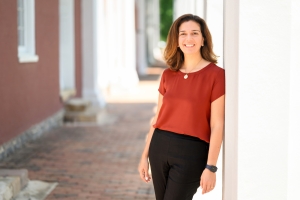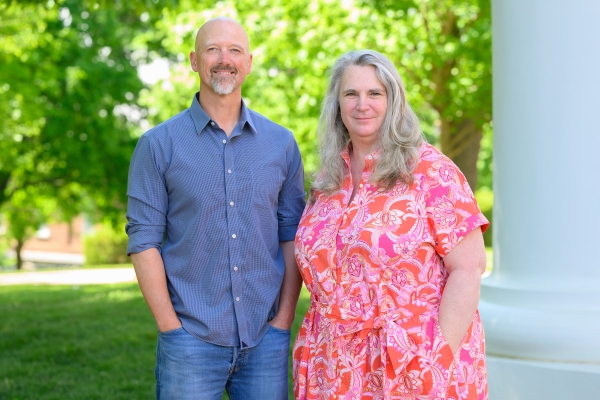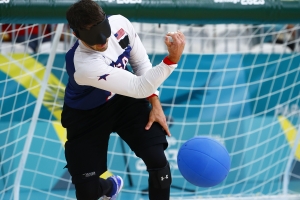
Office Hours: Robert Humston and Megan Fulcher Professors Robert Humston and Megan Fulcher are part of a team of faculty volunteers who serve as liaisons between athletics and academics.
The life of a scholar-athlete is a delicate balancing act. It takes tremendous dedication and discipline to meet expectations on both sides of the equation. To help students achieve that goal, Washington and Lee established a Faculty Athletic Mentor program in 2008 through which faculty members serve as role models who connect with student-athletes to provide support through additional counsel and advice when issues arise outside the scope of their academic advisers. Faculty mentors are dedicated to the idea of building a harmonious connection between the academic, athletic and social cultures of the university.
Professor of cognitive and behavioral science Megan Fulcher, who oversees the program, admits she was “not a sporty person” when she was invited to mentor the women’s soccer team. Fifteen years on, she laughs that she has learned a great deal about soccer but also valuable lessons about good coaching that translate naturally to great teaching.
“You can have warm relationships, but you also have to push. I am now more comfortable saying ‘work harder’ and giving critical feedback to my students. I admire that the athletes can meet these two demands,” she says.
Robert Humston, John Kyle Spencer Director of Environmental Studies and professor of biology, came to his role as mentor for the men’s wrestling team 14 years ago from the other end of the spectrum. He played “any sport they would let me play” in high school, including soccer, basketball and lacrosse. He then played varsity soccer and JV lacrosse in college.
“At first, I didn’t know how much I could learn as a faculty athletic mentor,” he says. “It’s been a revelation. The coaches are fantastic. I’ve learned a lot about good teaching through watching them. They coach the individual.
I see parallels in how they expect a lot of the athletes and how they rise to that expectation.”
Fulcher says the mentor serves as a liaison between the athletic and academic areas. “They can advise the student-athletes on how to explain to a professor why they have to be absent or with things like registration, which can be difficult because of their schedules. We can also help with recruiting and answer questions for newcomers,” she says.
CHEER SECTION
For both Humston and Fulcher, the most important part of their role is simply showing up. Fulcher goes to all home games for women’s soccer and some away games and makes cookies as a treat on a regular basis.
“I am a familiar face in the crowd,” she says. “It’s really fun. I have learned so much about soccer, and I get to know students from a different perspective. It forces us to see the whole student, and it really melds together what we think of as two sides of campus. I have started going to other sports events, and I wish more faculty and students attended. I believe it makes the players more engaged in the classroom when they know we care about it.”
Humston attends practices once a week if possible. “I just want to be visible, especially for the first-years,” he says. “The coaches invite me to sit on the bench so I can connect with those I don’t know as well. I try to attend home matches and at least one away game, and I like to travel on the bus to tournaments. That way, I have a chance to talk with them a little more.” At the end of the year, he invites the team to his home for a dinner of wild game.
BONUS POINTS
The benefits of this program are evident. W&L led the Old Dominion Athletic Conference with a record-breaking 537 student-athletes recognized for their achievements in the classroom for the 2023-24 academic year for earning a minimum 3.25 GPA.
“Division III athletics is much more demanding than it was in my day,” Humston says. “These days, they are doing so much and manage to do it so well. I like to show my appreciation for that, to recognize the effort outside and inside the classroom. You can never put down being a student-athlete. There is no off-season. It takes year-round dedication. It is pretty remarkable, to be honest, so it is not a surprise that it carries over to benefits in the classroom.”
W&L Faculty Athletic Mentors
Fall sports
Men’s cross country – Paul Youngman ’87 (associate provost, German) and Colin Reid (accounting)
Women’s cross country – Helen MacDermott (academic technologist) and Ryan Brindle (cognitive and behavioral science)
Football – Matt Tuchler (chemistry) and Michael Hill (DeLaney Center director, Africana studies)
Field hockey – Fred LaRiviere (associate dean, chemistry and biochemistry)
Women’s soccer – Megan Fulcher (cognitive and behavioral science)
Volleyball – Melissa Kerin (art history)
Winter sports
Men’s basketball – Jamie Casey (economics)
Women’s basketball – Erich Uffelman (chemistry)
Women’s swimming – Julie Woodzicka (cognitive and behavioral science)
Men’s swimming – Martin Davies (economics)
Wrestling – Robert Humston (environmental studies and biology)
Spring sports
Baseball – Drew Hess ’97 (business administration)
Men’s lacrosse – Art Goldsmith (economics)
Men’s tennis – Gavin Fox (business administration)
Women’s tennis – Mike Pleva (chemistry, emeritus) and Mark Coddington (journalism and mass communications)
Men’s track and field – Youngman and Reid
Women’s track and field – Sybil Prince Nelson ’01 (mathematics)
 Robert Humston, John Kyle Spencer Director of Environmental Studies and professor of biology, and Megan Fulcher, professor of cognitive and behavioral science
Robert Humston, John Kyle Spencer Director of Environmental Studies and professor of biology, and Megan Fulcher, professor of cognitive and behavioral science

You must be logged in to post a comment.